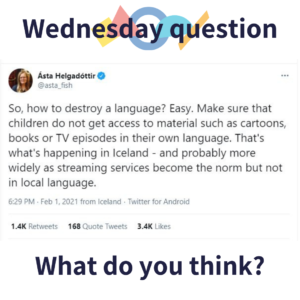Several people are feeling less secure in their work than they were a few weeks ago; immigration controls are tightening and one teacher has recently lost a few hours due to a company cutting funding. Several people added that more teachers are on part-time contracts and hours are fluctuating. There is an increasing feeling of uncertainty. Change is in the air; it’s exciting and scary!
Possibilities around teaching online were compared; online schools, teacher platforms and working totally independently are all options. Experiences are mixed; some of it is great (e.g. working with motivated students in multilingual international classes working with good professional companies), others not so good, and some of it is dreadful. Some teacher platforms charge crazy commission and it can take a while to get established. One suggestion is that pecialisation is a good way forward, e.g. PET groups, business classes and assessment. Should we invest time and energy now to earn more later?
There was an acknowledgement that we need to market ourselves and there is a fear around that; we’re ELT professionals, not marketeers. We don’t know how to prioritise and how to best spend our time, how do we know which online spaces to be in; Pinterest, Facebook, LinkedIn, personal blogs, newsletters, Instagram, tiktok…! Marketing can make us feel “dirty”, we need to create content or do things that is useful for people and we need to understand how different platforms operate and what works. How do we find work online? It seems to be that cracking it seems to depend on a big investment of time or money… we’re poor in both!
Perhaps we need to think of ourselves as our own personal businesses. How do we price our work, whether it may be teaching or writing work? Think like a business… how much do I need or want to earn per year? How many hours a week am I prepared to work a week? Don’t forget to take into account holidays, a few sick days, etc. And then do some maths to work out your hourly rate. Of course we need to compare the market rate but prices vary wildly and we need to do the right thing for us. And for some of us, it’s difficult to talk about money. Should we become properly, legally self-employed? We all should but some
thought that depended on the type of work that we do, in some situations it’s essential, perhaps to get the quality work with good companies we need to do things right. Is there a moral obligation too? Sometimes we need to “invest” time too and think what does this experience give us? It can be money, of course. It can also be new contacts, new possibilities, new doors opening. And perhaps we need to try to do fewer things, perhaps even fewer of the things that we love, to find some balance and sustainability.
We talked, in one group, about the Wednesday question about explaining the rationale of activities to our students. The general consensus was that, yes, we should. Of course we need balance and we need to continue to keep people engaged. Making connections and making things explicit for students is always beneficial. Helping students understand what’s going on also puts the responsibility in their hands and we can help them develop “Higher Order Thinking Skills” by encouraging questions and evaluation. We can help our students be creative, curious and empowered.
In the other group, we opened up the subject of the “rules online”, talking about interactions, clothing and behaviour in classrooms and in the workplace. We are all still trying to define what is appropriate. Some participants online are getting creative changing their name to “connecting…” or “buffering…”. We’re pretty much a year into this we’re still trying to get to terms with all this. Are we all hoping to just go back to some version of “normal”? Is this all just a stop gap? Some people love it, some people hate it. It appears that materials writing has changed very little thus far, publishers are thinking longer term to a point when we are back to “normal”. Are we all just making do, just adapting what we can while we have to rather than making real changes? Perhaps we should rethink some basic ideas. Perhaps the biggest question was about the communicative approach… does it still work in the online environments? Is it still fit for
purpose? Or does it need a radical rethink?









